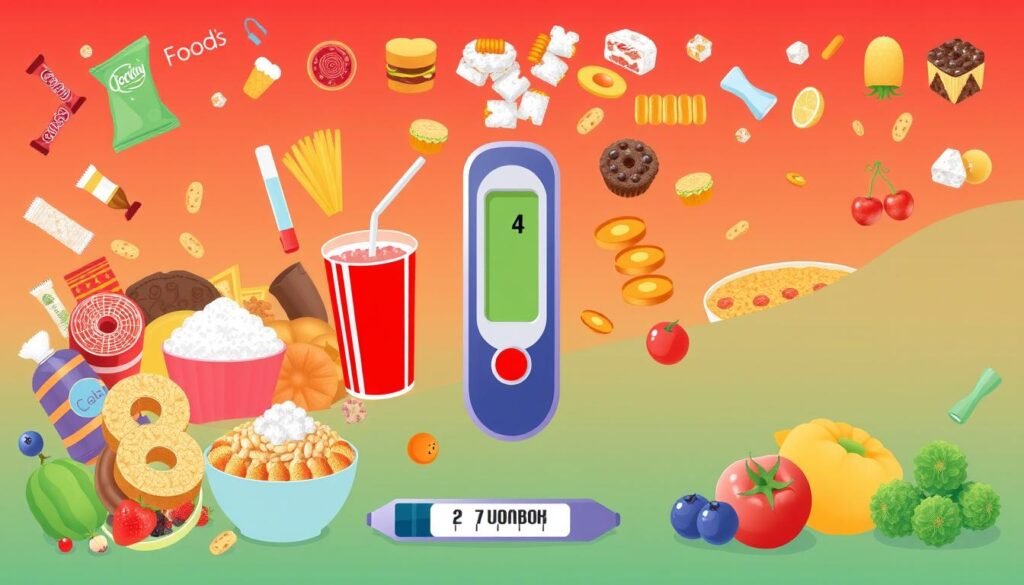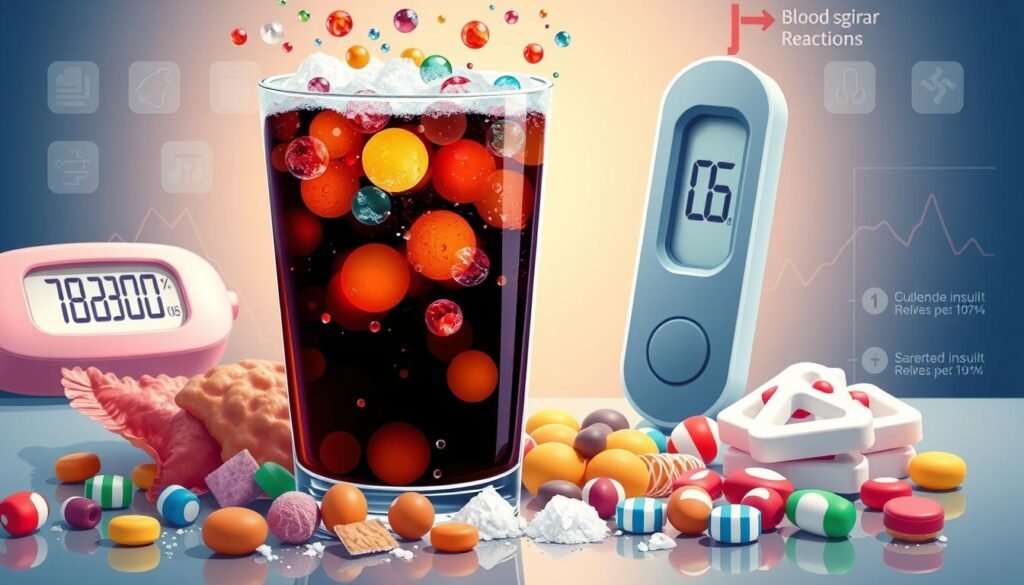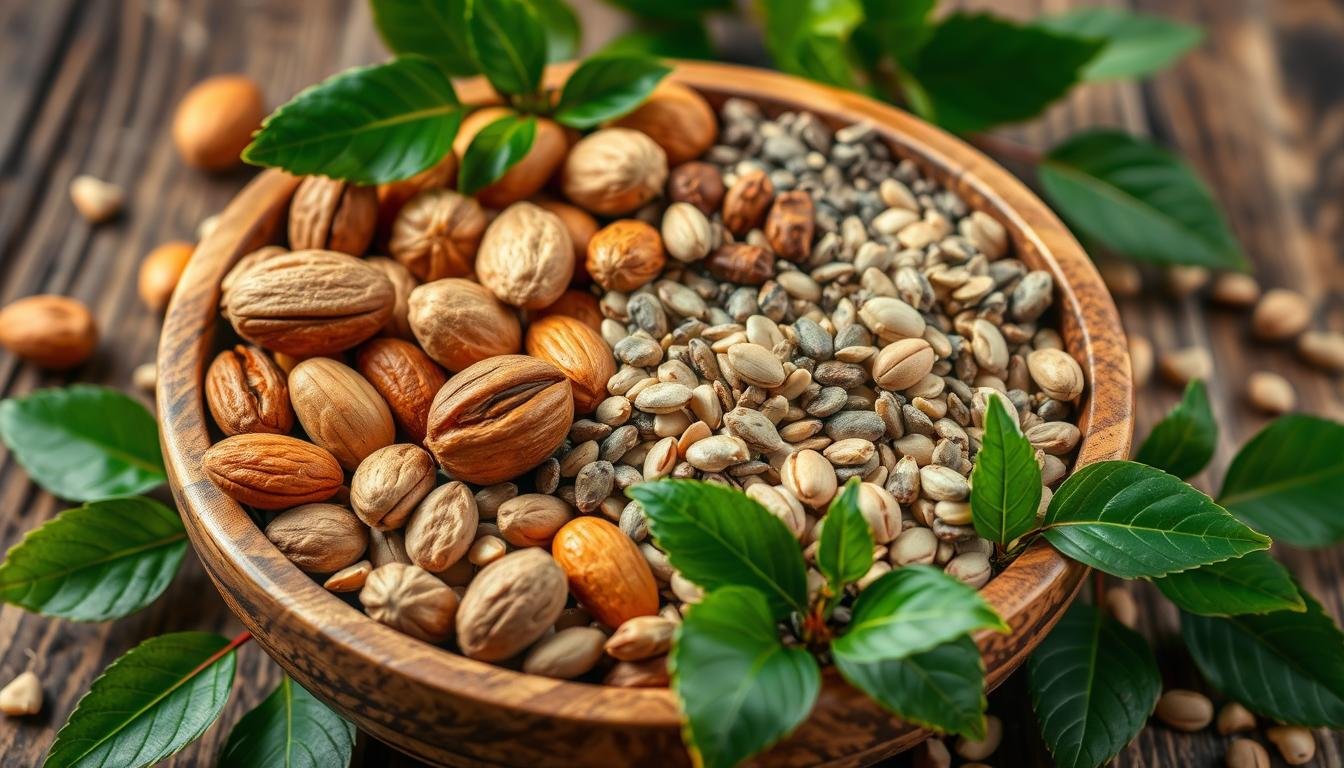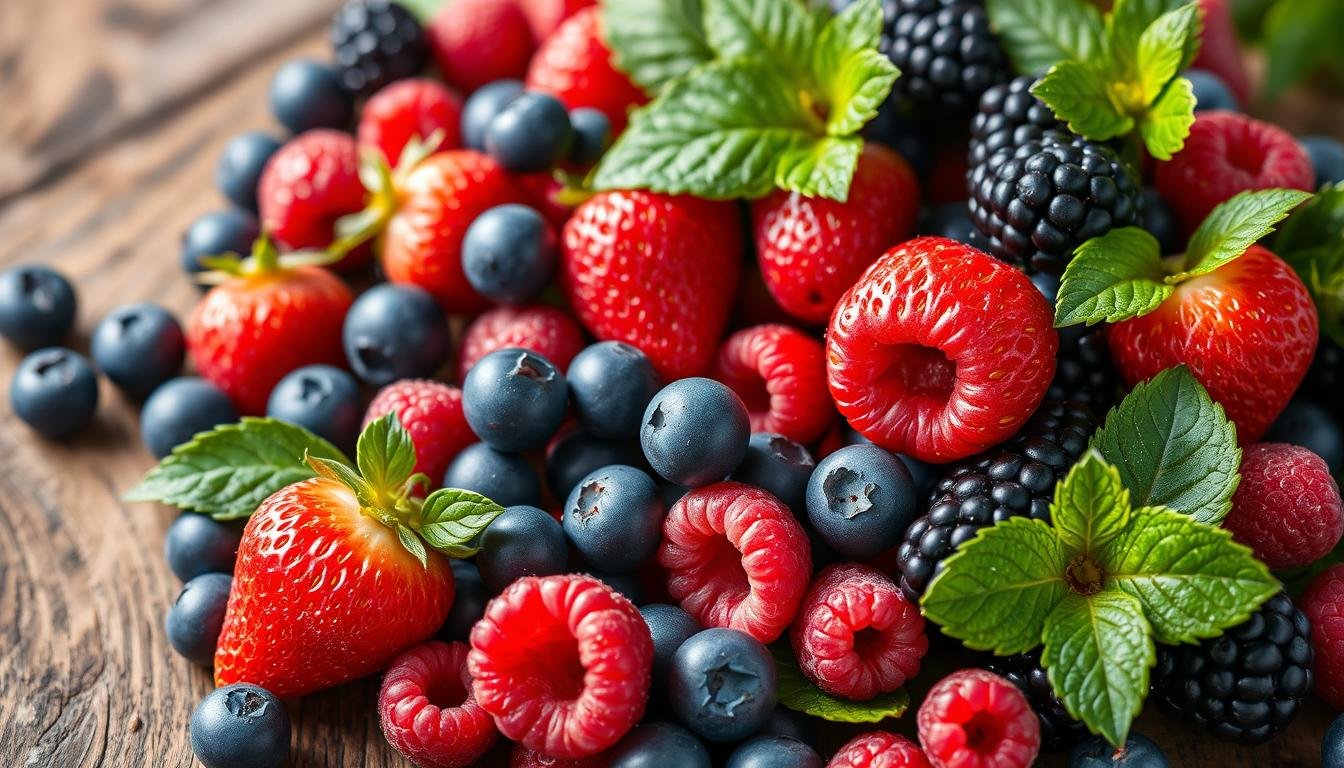Nearly 34 million Americans live with diabetes, and what they eat is crucial. Not every food is good for managing this condition. Some can really impact blood sugar levels and health. It’s key to know which foods to avoid when managing diabetes. This helps people make better choices for their diet. We’ll cover which foods to cut back on or skip to help those with diabetes.
Key Takeaways
- Managing diabetes requires careful attention to dietary choices.
- Focusing on balanced diets for diabetes can improve overall health.
- Identifying high-risk foods is crucial for blood sugar control.
- Implementing diabetic diet tips can simplify meal planning.
- Making informed choices empowers individuals living with diabetes.
Understanding Diabetes and Diet
Managing diabetes well means knowing how diet affects blood sugar. The role of diet in diabetes is huge. It’s key to staying healthy, whether you have type 1 or type 2 diabetes. The food choices you make each day deeply impact your glucose control.
Type 1 diabetes requires counting carbs carefully. You must match your insulin to your food choices to keep sugar levels stable. For type 2 diabetes, it’s important to manage weight and pick healthier foods.
Carbs, fats, and proteins all affect your glucose. Carbs have the biggest effect, so it’s crucial to watch them closely. Sticking to a diabetic-friendly diet is essential for your health. For proteins and fats, eating them in moderation is best. Picking them wisely helps avoid spikes in blood sugar.
Portion control is key in managing diabetes. Eating a balanced diet with whole foods keeps energy steady. Adding fruits, vegetables, whole grains, and lean proteins is good for health and diabetes management.
A smart eating plan improves overall health. Knowing how food choices impact you is crucial in diabetes care. It shows how vital good nutrition is.
High-Sugar Foods You Should Skip
When it comes to diabetes, choosing what to eat is key. Foods high in sugar can badly impact blood sugar levels. This can lead to serious health issues. Knowing which foods to avoid helps in making better choices.
The Impact of Sugar on Blood Sugar Levels
Eating foods that are high in sugar causes blood sugar to shoot up quickly. For those with diabetes, these spikes are extra dangerous. The body’s insulin can’t keep up with these quick rises. Eating too much sugar often can upset your body’s balance, making it hard to control sugar levels.
Examples of High-Sugar Foods
Many foods are high in sugar, which makes managing diabetes tougher. Some common ones to watch out for are:
- Candies and chocolate bars
- Sugary sodas and energy drinks
- Sweetened cereals
- Desserts like cakes and ice cream
- Processed snacks that have added sugars
It’s important to read the labels on food. A lot of processed foods have hidden sugars. Knowing about these foods helps people with diabetes manage their diet better.

Refined Carbohydrates: The Hidden Threat
Many people don’t know the danger refined carbs pose to those with diabetes. These foods can make blood sugar levels shoot up. Knowing how refined carbs affect your health helps you choose better foods.
How Refined Carbs Affect Diabetes
Refined carbs turn into sugar in your blood fast, causing sudden increases in blood sugar. This can raise your diabetes risk and lead to problems like insulin resistance. Eating lots of refined carbs makes it hard to control blood sugar. So, it’s important to watch what you eat closely.
Common Sources of Refined Carbohydrates
Common sources of refined carbohydrates include:
- White bread
- Pastries and cakes
- Sugary cereals
- White rice
- Pasta made from refined flour
Choosing whole grains over these foods can really help people with diabetes. For more diabetes management tips, check out other coping strategies about changing your diet.
| Type of Carbohydrate | Blood Sugar Impact | Healthier Alternative |
|---|---|---|
| White Bread | High | Whole Grain Bread |
| Pastries | High | Whole Grain Muffins |
| Sugary Cereals | High | Oatmeal |
| White Rice | Medium | Brown Rice or Quinoa |
| Refined Pasta | Medium | Whole Wheat Pasta |
Processed Meats and Their Risks
Processed meats, like bacon, sausage, and deli meats, are linked to health concerns. They can particularly affect diabetes risk. A University of Cambridge study found a 15% higher risk of type 2 diabetes from these meats. This is due to preservatives and additives that cause inflammation and affect insulin.
How Processed Meats Relate to Diabetes
High intake of processed meats can up one’s diabetes risk. This happens because of their impact on diet quality. With lots of saturated fats and sodium, these foods can lead to insulin resistance. This makes managing blood sugar hard. Knowing these risks helps in making healthier food choices.
Reducing processed meats can boost health and lower diabetes risk. It’s an important step for anyone caring for their health.
Healthier Alternatives to Processed Meats
There are many healthier meat options out there. Lean meats like chicken or turkey and fish are good choices. There’s also plant-based proteins like legumes, nuts, and dairy. These offer nutrition without the downsides of processed meats.

Shifting to healthier meat options can better your health and cut your diabetes risk. Focusing on these choices lets you enjoy a tasty diet while staying healthy.
| Processed Meats | Healthier Alternatives |
|---|---|
| Bacon | Turkey bacon |
| Sausages | Grilled chicken sausages |
| Deli meats | Lean roast beef or turkey |
| Hot dogs | Plant-based hot dogs |
| Salami | Fish fillets |
Fried Foods: A Double Trouble
Fried foods are a challenge for people with diabetes. They taste great but are full of bad fats and calories. These can lead to health problems.
Eating them often can cause weight gain. This makes controlling blood sugar and managing diabetes harder.
Unpacking the Health Risks of Fried Foods
Fried foods do more than just add calories. They can make insulin work less well and raise blood fat levels. This creates big problems for those with diabetes.
Eating fried foods can also cause inflammation. This inflammation can worsen diabetes and increase heart disease risk.
Healthier Cooking Methods to Consider
There are better cooking methods that keep food tasty but are healthier. Baking, grilling, and steaming are good alternatives. These methods make meals interesting and improve health.
For instance, roasting vegetables is a tasty swap for fried potatoes. People with diabetes should try using herbs and spices. This will make healthy dishes even more flavorful.
For more insights on managing diabetes and food choices, check this valuable resource.
Sugary Beverages: A Major Culprit
Sugary beverages can greatly affect health, especially blood sugar levels. Drinks like sodas, sweet teas, and fruit punches can make glucose levels spike quickly. Besides offering little nutrition, they also lead to taking in too many calories. This ups the risk of problems from diabetes.
The Relationship Between Sugary Drinks and Blood Sugar
It’s best to avoid drinks with lots of added sugars for diabetes management. Sugary drinks quickly raise blood sugar levels. This makes it hard for those with diabetes to keep their glucose stable. Studies show that even a little bit of these drinks can hurt how well the body handles insulin.
Better Beverage Choices for Diabetics
Luckily, there are many better options than sugary drinks for staying hydrated. Some healthier choices include:
- Water
- Herbal teas
- Sparkling water
Adding these options to your daily habits can help improve health while dealing with diabetes. It’s very important to stay hydrated. Picking the right drinks can really help.

| Beverage Type | Blood Sugar Impact | Calories (per serving) |
|---|---|---|
| Soda | Rapid increase | 140 |
| Sweet Tea | Rapid increase | 100 |
| Fruit Punch | Rapid increase | 150 |
| Water | No impact | 0 |
| Herbal Tea | No impact | 2 |
| Sparkling Water | No impact | 0 |
Trans Fats: What You Need to Know
Trans fats are unhealthy fats that can harm your health, especially for those with diabetes. They make bad cholesterol go up and good cholesterol go down. This increases the risk of heart disease, which is even more dangerous for people with diabetes.
The Health Implications of Trans Fats
Studies highlight the dangers of eating trans fats. Eating them often can lead to severe health problems. These include a higher chance of heart disease, more inflammation, worse insulin resistance, and possible weight gain.
- Higher risk of heart disease
- Increased inflammation in the body
- Worsening insulin resistance
- Potential weight gain
Foods High in Trans Fats to Avoid
It’s vital to pay close attention to nutrition labels while grocery shopping. Be wary of foods with trans fats such as:
- Margarine and shortening
- Store-bought baked goods, like cookies and pastries
- Fried snacks, including doughnuts and potato chips
- Some frozen pizzas and pre-made meals
The Dangers of Alcohol Consumption
Alcohol can be a big issue for people with diabetes because it affects blood sugar levels. It can cause low or high blood sugar, depending on the amount and if food is eaten with it. This makes it vital for diabetics to be cautious with alcohol. Knowing how it interacts with diabetes is key for good health.
How Alcohol Can Affect Blood Sugar Levels
Alcohol can stop the liver from making glucose, which may lead to low blood sugar. This is especially true for those on diabetes medications. On the other hand, drinking a lot at once can raise blood sugar levels. This creates a cycle of ups and downs in blood sugar. People with diabetes need to know these risks and watch their health closely.
Moderation and Safer Choices
For diabetics, drinking safely means doing so in moderation. Choosing drinks with less sugar and always eating first can lower the risks. By following these tips, diabetics can enjoy drinks without harming their health. The American Diabetes Association has more tips on drinking safely for diabetics.


